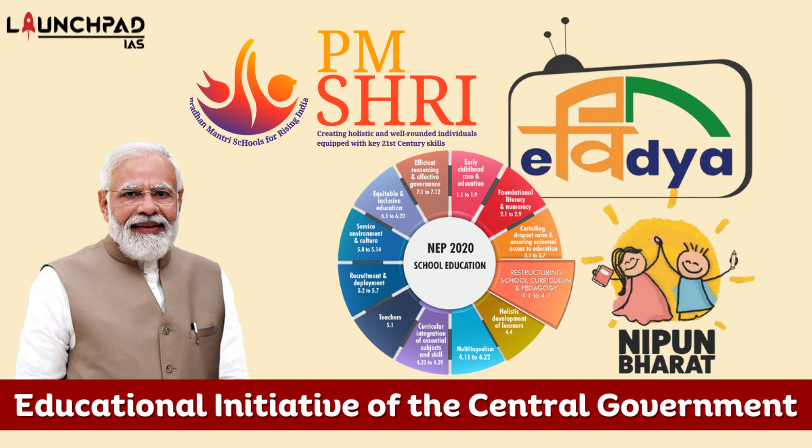New Educational Initiative of the Central Government are discussed below as India is set to complete two years of National Education Policy (NEP) 2020.
Kalashala Initiative
Kalashala Initiative is an Educational Initiative of the Central Government. It will be launched in 750 schools. It envisions educating children about the various art forms of India & help them discover the country’s rich cultural heritage. The school students will learn about various art forms through lecture demonstrations by a visiting artist.
PM Schools for Rising India (SHRI)
- PM-SHRI scheme is another Educational initiative of the Central Government that aims to provide high-quality education in an equitable, inclusive, and joyful school environment.
- It is a centrally sponsored scheme launched in September 2022 for the upgradation and development of more than 14500 Schools across the country.
- Rs. 630 crore has been allocated to upgrade schools under the PM SHRI initiative.
NIPUN Bharat
The next Educational Initiative of the Central Government is NIPUN Bharat. The vision of the National Initiative for Proficiency in Reading with Understanding and Numeracy (NIPUN) Bharat Mission is to create an enabling environment to ensure the universal acquisition of foundational literacy and numeracy, so that every child achieves the desired learning competencies in reading, writing, and numeracy by the end of Grade 3, by 2026-27.
PM e-VIDYA
Another Educational Initiative of the Central Government PM e-VIDYA initiative aimed to promote online education and digital learning by providing various e-learning platforms like DIKSHA and offering e-books and e-contents to students across the country.
School Innovation Policy
- The National Innovation and Entrepreneurship Promotion Policy guides school education systems on various measures to promote a learning environment where the innovation, problem-solving, and entrepreneurship skills of students are nurtured.
- Six pillars to promote IIE (Ideation, Innovation, and Entrepreneurship) in the school education ecosystem:
- Mindset Change, Awareness, and Training
- Infrastructure and Mentoring to Nurture Innovations
- Incentivizing and Encouraging Teachers
- Pedagogical Innovations
- Collaborative Partnership- School & Community
- School Entrepreneurs Led Startups
IKS-MIC program for technology demonstration:
- It is a joint program of the IKS (Indian Knowledge System) Division and the Ministry of Education Innovation Cell.
- Aim: promote the development of products, and processes inspired and developed by the Indian’s traditional knowledge systems.
- It will solicit proposals for the demonstration of technologies and the development of prototypes in technology, engineering, and sciences.
- Successful participants will be encouraged to form startups and handholding will be done through the IKS-MIC Virtual Hub of Innovation.
Introduce 75 Bharateeya Games in Schools
- Objective: To introduce Bharateeya games to children.
- Many of the traditional games are less resource incentive and encourage creativity, camaraderie, and connection with the culture of Bharata.
- Each month, a seasonally appropriate Bharateeya game will be introduced in schools through the PT teachers.
- The PT teachers will upload the pictures and short videos.
- Best-performing schools and PT teachers will be recognized with a certificate.
- Simultaneously, the students will be able to participate in a quiz on the mygov.in the portal and earn certificates.
Setting Up of Virtual Labs
- To promote crucial critical thinking skills, to give space for creativity, 750 virtual labs in science and mathematics, and 75 skilling e-labs for simulated learning environments, will be set up in 2022-23.
- A vertical on Virtual Lab has been created on the DIKSHA portal, in the subjects of Physics, Chemistry, Mathematics, and Biology for classes 9 to 12.
- Beneficiaries: Students, Teachers, and Teacher Educators at Middle and Secondary stage.
- Expected Benefits: Development of skills and competencies of school students and teachers which will have an impact on the quality of teaching-learning and assessment process.
NDEAR (National Digital Education Architecture) Compliant Vidya Sameeksha Kendra (VSK)
- An NDEAR-compliant VSK enables a shared view to enhance data-driven decision-making to drive action by key stakeholders for program success organizational pathway.
- VSK can be a “Force Multiplier” that multiplies the existing capabilities of people or systems, enabling transformative impact towards outcomes.
- Beneficiaries: Schools, Teachers, Students, and Administrators across the country.
- Expected Benefits: The data relating to PMeVIDYA, DIKSHA, NDEAR, POSHAN, NISHTHA, NAS, PGI, UDISE, etc. shall be collected, collated, analyzed, and showcased to facilitate policy decisions.
Educational Innovation in GIFT City
- NEP 2020’s innovative approach extends to Gujarat’s GIFT City, where world-class foreign universities and institutions are permitted to offer specialized courses.
- This move, free from domestic regulations, aims to nurture high-end human resources for financial services and technology.


